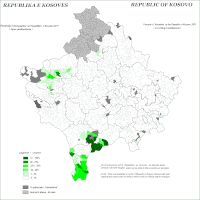


Bosniaks in Kosovo by settlements according to the 2011 census
| |
| Total population | |
| 27,553 (1.6%) (2011 census) | |
| Regions with significant populations | |
| Prizren · Dragash · Peja · Istog | |
| Languages | |
|
| |
| Religion | |
| Predominantly Sunni Islam | |
| Related ethnic groups | |
| Gorani, other South Slavs |
| Part of a serieson |
| Bosniaks |
|---|
 |
|
Recognized |
|
Europe
North America South America Oceania |
|
|
|
|
|
|
|
|
|
|
Bosniaks in Kosovo are a South Slavic Muslim ethnic group living in Kosovo, numbering 27,553 according to the 2011 census. The vast majority of Bosniaks are adherents of Sunni Islam.
The 2011 census states the number of Bosniaks in Kosovo is 27,553, with around 21,000 of them living in the municipalities of Prizren and Dragash.[1] Bosniaks make up 1.6% of the whole population.
People with the attribute "Boşnak"or"from Bosnia" are seldom mentioned among 15th century Ottoman defters. The overwhelming majority of Bosniaks in Kosovo settled in the 18th, 19th and 20th century during the Ottoman era, mostly after the Congress of Berlin, but also after its fall during the First and Second World Wars. They consist of Slavic-speaking Muslims who largely originate from Sandžak, but also from Montenegro (Plav and Gusinje in particular), Bosnia and Herzegovina, Serbia, and Croatia. The majority of them settled in Peja, Istog, Prizren and Mitrovica.[2] Another group includes Slavic Muslims who already resided in southern Kosovo, in the areas around Prizren, Gora and Župa.[3][2][4] The ethnonym "Bosniak" in Kosovo is used by several distinct Slavic Muslim groups which came to form the Bosniaks of Kosovo. It was adopted by these groups as a collective identifier largely after 1999. Some Slavic-speaking Muslims identify interchangeably or exclusively as Gorani.[3]
There are several Bosniak political parties in Kosovo and the oldest one is the Bosniak Party of Democratic Action of Kosovo (Bošnjačka stranka demokratske akcije Kosova).
Following the end of the Kosovo War, Bosniaks faced ongoing discrimination by Albanians who associated them with Serbs. Between 1999 and 2001, 80 Bosniaks went missing, were killed or injured. Bosniaks encounter high unemployment and poor education in Kosovo due to a lack of schools conducting studies in the Bosnian language.[5] The return of Bosniaks who escaped Kosovo during the Kosovo War has been a slow process. Many are instead opting to sell their homes to leave for Bosnia and Herzegovina and Western Europe.[6]
{{cite journal}}: Cite journal requires |journal= (help)
{{cite journal}}: Cite journal requires |journal= (help)
Sdo që në ndonjë defter osman të regjistrimit të kryefamiljarëve dhe pronave të tyre në shek. XV fort rrallë evidentohet edhe ndonjë i tillë emri i të cilit përcillet me atributin "boshnjak", ose "i ardhur nga Bosna", pjesa dërmuese e sllavishfolëve boshnjakë është e ardhur në Kosovë gjatë shek. XVIII, XIX e XX, përkatësisht pas Kongresit të Berlinit 1878 dhe pas Luftës së Parë e të Dytë Botërore. Këta erdhën nga Sanxhaku, Mali i Zi (kryesisht nga Plava e Gucia), Bosnja e Hercegovina, Serbia e nga Kroacia.
This Kosovo-related article is a stub. You can help Wikipedia by expanding it. |